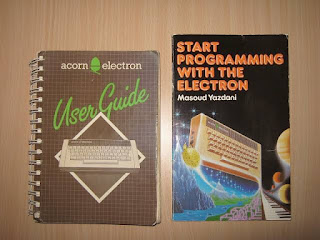And in the beginning, there was, an Acorn Electron. Yes, the "King of the 8-Bits" BBC Micro's little brother, and, well, he wasn't very good. In their efforts to reduce the Beeb's chip count and cut costs to a Sinclair Spectrum-rivalling price-point, Acorn bottlenecked the processor's access to memory so that while for the most part it was compatible with BBC BASIC, programs would run, at best, around half the speed of the Model B.
8-year-old me neither knew nor cared about this however; I had a computer, in my bedroom, and it was amazing. I'm pretty sure my Dad picked the computer up from Curry's or Dixons (UK high street electrical retailers) at a heavily discounted price, just in time for my birthday. As he is a complete luddite I'm fairly sure he was advised by a family friend (a teacher) that the BBC Micro (or indeed, something compatible) would be a fine choice; I don't recall ever outwardly expressing a desire for a home computer but had certainly enjoyed playing the BBC B at our friends' house. That machine was very well specced with a disc drive and dedicated colour monitor; my setup was substantially lower-rent with a domestic-grade cassette recorder and a monochrome television pressed into service for display duties. Sadly I don't have a picture of my first "workstation" but here are some very close approximations: The cassette recorder here is almost identical to what I had, in the same position to the left of the Electron, because that's where the I/O and motor control connectors were and the cable wouldn't reach anywhere else. Here's the mighty Binatone 12-inch monochrome TV that was my "monitor". I was very pleased to be able to recall that brand name! It plugged into the Electron's RF port and had to be tuned in for a nice sharp picture. Although pretty crappy by almost every measure, I was at least lucky enough to have this TV dedicated for my computing, and so didn't have to share the family TV.
Together with the hardware came a veritable mountain of boxed software; almost all of it from Acornsoft in their distinctively-80s graph-squares-and-neon-script style:






No comments:
Post a Comment
Comments welcome - spam is not. Spam will be detected, deleted and the source IP blocked.